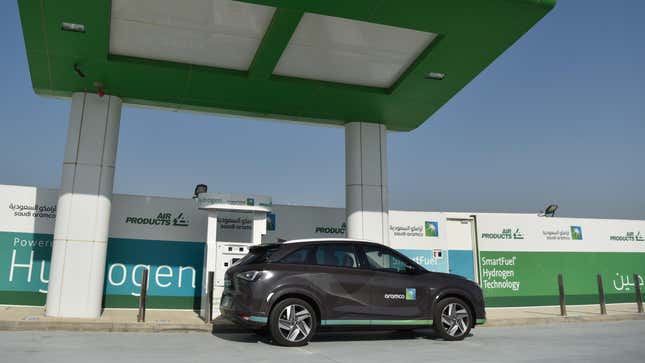
Calling all ladies: Saudi Arabia wants you to work to develop some special forms of energy, just for girls. Saudi Energy Minister Abdulaziz bin Salman made comments last week about the country’s supposed clean energy strides that also promote gender equality. That right, gals. We’re talking about pink hydrogen.
“We are recruiting, by the way, young Saudi ladies that are happy to see the pink [hydrogen] coming along,” bin Salman said during an online World Economic Forum talk this year. “We have started being very conscious of taking care of our female new recruits and new cadets. We’re becoming an extremely well emancipated society.”
Whew! There’s a lot to unpack there!!!
The special pink hydrogen bin Salman referring to isn’t just a girlboss marketing technique. Hydrogen fuel can be produced many different ways, denoted by an expanding rainbow of colors. The techniques include gray (hydrogen made from fossil fuels) and green (made from renewables like wind and solar). Pink hydrogen, meanwhile, is hydrogen that uses nuclear energy to power the hydrogen separation process. Creating pink hydrogen is a highly technical process, that would nevertheless help reduce carbon pollution compared to its dirtier counterparts. French President Emmanuel Macron has also talked it up as a way for his country to meet its goals to ramp up hydrogen production.
I’m not going to get into the complex geopolitical ramifications of women’s rights in Saudi Arabia, which would be a whole treatise in itself. The current government has made much of its recent moves to give women more rights—but a whole host of restrictions on women’s lives persist, and the country still slots in at 147 of 156 countries on the World Economic Forum’s gender rights gap rankings.
Energy has always had a weird gendered element to the discussion. The conservative movement in the U.S. right now is steeped in the idea that fossil fuel production is a part of an American “macho” identity that scholars have coined a term for it: “petro-masculinity.” You don’t have to look too hard for examples of this attitude all over our popular culture, from gas companies complaining about cancel culture, to right-wing commenters’ use of the “soyboy” insult. It’s not exactly surprising that different forms of hydrogen are now being described using this terminology.
The possibility of using liquid hydrogen to power hard-to-decarbonize sectors has picked up real momentum in recent years, but making hydrogen fuel requires separating it from other elements like water, natural gas, and fossil fuels—a process that is pretty expensive and energy-intensive. Creating hydrogen from fossil fuels can also emit a lot of carbon dioxide in the process. Hydrogen boosters, including fossil fuel companies, decided that dirty gray hydrogen needed a facelift, so came up with a new color: blue hydrogen, or hydrogen made from fossil fuels that then uses carbon capture and storage, or CCS, to get rid of the excess carbon dioxide emissions.
Unfortunately for the planet, blue hydrogen is a pretty terrible idea: A recent study found that blue hydrogen has just a slightly lower carbon footprint than its gray counterpart, and emits a whole lot more methane. And the CCS technology isn’t exactly a slam dunk. Just last week, a report found that a blue hydrogen production plant owned by Shell was actually capturing less than 40% of the plant’s total emissions.
Even with all his rah-rah girl power energy for pink hydrogen, it’s this blue hydrogen—hydrogen for boys, if you will—that bin Salman seems the most excited about. Saudi Arabia said last year that they’re planning on using one of the world’s biggest gas fields to exclusively produce blue hydrogen. This field is a key component of Saudi Arabia’s new pledge to reach “net zero” by 2060, which includes other oil industry-friendly ideas like planting trees, “low carbon fuel,” and CCS.
Given that bin Salman laughed at the idea of decreasing oil production last year, or that Saudi Arabia is currently building a tourist resort on top of an oil rig, it’s clear that this “net zero” pledge, like other pledges from major oil producers, is mostly bullshit. Not exactly a girlboss attitude.